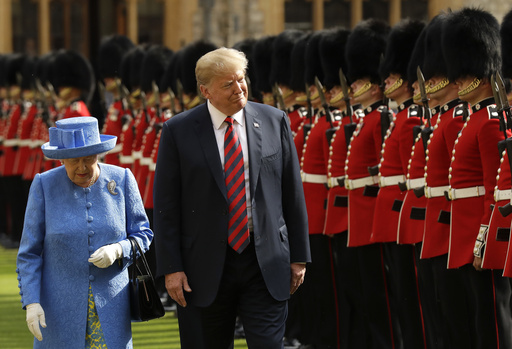LONDON — Since Winston Churchill first described it after World War II, the concept of a “special relationship” between the United States and Britain has been a hallmark of diplomatic dialogue. Under President Donald Trump’s second term, however, the UK is adjusting its expectations, moving toward a more pragmatic approach in its ties with its historically significant ally. As Trump considers imposing tariffs on neighboring countries, discusses the possibility of purchasing Greenland, and hints at potential U.S. control over Gaza’s reconstruction, Prime Minister Keir Starmer’s government is actively trying to reinforce its diplomatic and economic strategies in an emerging era of turbulent transatlantic relations.
It’s an uncertain landscape, and Kathleen Burk, an emeritus professor at University College London specializing in U.S.-U.K. relations, emphasizes the unpredictability of the current global situation. “We’re in such uncharted waters that anyone who claims to know what in the hell is going on is just lying,” Burk stated.
Starmer is reportedly aiming for a trip to Washington in the near future, although he has not yet received an official invitation from Trump. This places significant responsibility on Peter Mandelson, the UK’s new ambassador to the U.S. A high-profile figure within Starmer’s Labour Party and a former member of Tony Blair and Gordon Brown’s cabinets, Mandelson succeeds Karen Pierce, a diplomat who enjoyed respect across party lines in Washington. It is uncommon for a politician to assume a prominent ambassadorial role, especially since Mandelson has openly criticized Trump in the past, labeling him a “danger to the world”—remarks he now considers “ill-judged and wrong.”
Despite his controversial background, some analysts regard Mandelson as a strategic selection for the role. Having previously resigned from government due to allegations of financial misconduct, his resilience and intrigues in politics earned him the nickname “Prince of Darkness.” Jill Rutter, from the Institute for Government, describes Mandelson as a “considerable political talent” with relevant economic experience from his tenure as the EU’s trade commissioner between 2004 and 2008. Rutter highlights his comfort with affluent individuals and his extensive connections, noting that she anticipates he will host lavish gatherings.
To augment its diplomatic efforts, Britain is also looking to leverage the royal family. Trump has shown admiration for the monarchy, noting his Scottish heritage through his mother’s family, and praise for Queen Elizabeth II following their previous meeting in 2019. A formal return visit from Trump to the UK, featuring the usual grandeur and ceremonial touches, appears probable.
On the political right within the UK, some see Trump’s presidency as an occasion to strengthen U.K.-U.S. trade relations, potentially even achieving a long-sought free trade agreement. Although discussions about a trade deal began post-Brexit in 2020, negotiations faltered over contentious issues, such as U.K. opposition to importing chlorinated chicken and hormone-treated beef. Compounding this issue is Starmer’s inclination towards enhancing trade relations with the EU, calling for a “reset” after a period of strife related to Brexit. The UK now finds itself at a crossroads, needing to navigate its ties with both the U.S. and the EU, raising concerns about having to choose between the two.
In parliamentary discussions, Conservative MP John Cooper emphasized a clear decision in favor of the U.S., arguing that under Trump’s leadership, “the American eagle is starting to spread its wings,” while Europe suffers from economic stagnation and political disarray. Conversely, Leslie Vinjamuri, from Chatham House, contested the notion of a binary choice between Europe and America, arguing that while the U.S. serves as Britain’s largest individual trading partner, a significant portion of U.K. trade is conducted with EU nations. “They can’t choose,” she stated, asserting that collaboration among the U.S., Europe, and the U.K. is essential.
Trump’s approach has already placed pressure on long-standing allies, as he proposed hefty tariffs on goods from Canada and Mexico before reversing the decision following security commitments from those nations. While suggesting that Britain might avoid similar tariffs, he expressed optimism about reaching an agreement as necessary.
Additionally, the current American administration has prompted Britain to rethink its defense spending strategy. Trump has been vocal about questioning NATO’s value and has indicated that member countries who fall short of defense targets risk losing U.S. support. The president insists that countries should allocate at least 5% of their income to defense instead of the existing 2%. Britain is committed to increasing its defense budget to 2.5%. According to Burk, “the one thing that the Americans will pay attention to is the defense budget” because the decline in Britain’s military capacity since the 1970s has diminished its influence with the U.S.
In supporting Ukraine against Russia’s invasion—an issue that Trump seems keen to resolve under his terms—British officials are eager to ensure that the U.S. continues its backing for Ukraine and does not entertain agreements advantageous to Russian President Vladimir Putin. The UK is also closely monitoring what these changes mean for essential intelligence-sharing operations, particularly with the appointment of Trump’s new Secretary of State and apprehensions surrounding his Nominees for the FBI and national intelligence positions.
Given the unpredictable nature of the forthcoming years, analysts stress that British ministers and civil servants must prepare for unexpected scenarios and develop adaptable strategies. Rutter raised concerns about potential future crises in the U.S. that might necessitate travel advisories for British citizens—a sign reflecting deteriorating situations in U.S. governance. As Vinjamuri poignantly noted, Britain’s traditional strength in quiet diplomacy will be tested extensively, emphasizing the need for strategic collaboration moving forward. The forthcoming years may hold both known and unknown challenges, leading to a complex diplomatic landscape.



